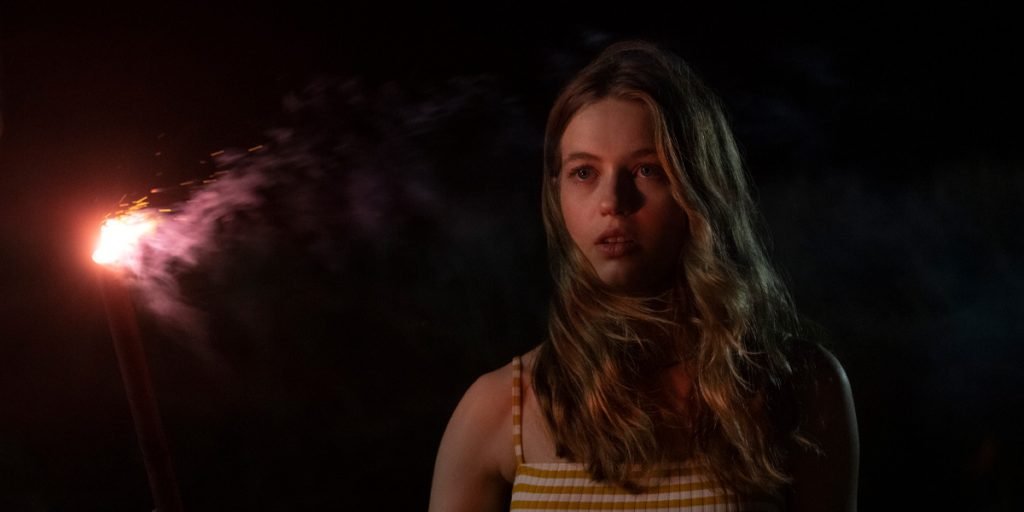Panic is a watchable but painfully average series that relies heavily on clichés and fails to deliver on the possibilities of its premise.
I vividly remember the first time I read Lauren Oliver’s 2014 novel Panic. I was browsing through my school’s library and found it wedged in the realistic fiction section. Immediately hooked by the premise and wanting to fill the Hunger Games-shaped hole in my heart, I picked it up. After that first read, I would inevitably come back to Panic three or four more times before I graduated, my last read coming at around the beginning of my senior year in 2018. Oliver’s book, while nothing groundbreaking, was an expertly paced YA thriller that smartly capitalized on the success of franchises such as The Hunger Games and Divergent by incorporating similar plot elements while still being unique. Coming seven years after the release of the novel, the Amazon Prime series adaptation of Oliver’s novel is a tired, contrived slog that falls into the worst tendencies of teen television while making no attempt to modernize the source material.
While the story of Panic won’t blow you away, it is a solid premise from which to build a novel. In the dead-end town of Carp, New York, graduating seniors compete in a local summer tradition called Panic. Panic consists of a series of challenges that increase in intensity and danger that gradually eliminate players until only one remains. The winner receives a cash prize and, by extension, a chance to leave Carp and make something of themselves. The novel splits its time between Heather Nill (Olivia Welch) and Dodge Mason (Mike Faist, of The Bikeriders), two seniors that both have their own reasons for playing and will do whatever it takes to win. Other minor characters include Heather’s best friend and fellow player Natalie Valez (Jessica Sula), as well as Heather’s best friend/love interest Bishop (Camron Jones), who opted not to play. Over the course of the summer, Heather, Dodge, and (to a lesser extent) Natalie get drawn into the game even as it becomes more apparent that they could lose their lives if they continue. Oliver paces the story well and gives the characters believable motivations. It’s the kind of novel that could be made into a film or a series with minimal changes and turn out reasonably well.
Now, although the series is a separate entity from the novel and is not beholden to the original story, multiple comparisons will be made between the novel and the series throughout this review to show how many of the changes the series made were for the worse. The first of which is the decision to make Heather the sole protagonist of the series and relegate Dodge to a supporting role. While Heather is an interesting character with a satisfying arc, the dual POVs in the novel allow both player’s stories to be satisfyingly explored. Unfortunately, the series drags out her development from half of a 400-page book to the entirety of a ten-episode series, leaving the audience bored when the climax arrives and her arc is completed. Dodge, on the other hand, is forced to squeeze all of his plot and character development into one or two scenes each episode, which is far too little time for the audience to form a connection with him. This is just one such example of a recurring problem the series faces: it simply has too little material to justify the nearly seven-hour runtime of the series.

The other big change the adaptation makes in an attempt to pad its runtime is arguably the worst offense against both the source material and the audience. The limited POV of the novel allows for a lot of information to remain unknown to our characters and, by extension, the reader. For the series, Oliver adds in a subplot of the police investigating Panic that takes up a large portion of each episode and eliminates much of the suspense from certain scenes. In the source material, law enforcement is a distant threat: Panic is technically illegal in Carp, and every year the police try and fail to stop it. Oliver allots this less than a paragraph in the book but gives it as much (if not more) importance than the game itself in the series. We become intimately familiar with the police department and their investigation into both the current game and last year’s game in which two players tragically died. The storyline starts as a vague annoyance and gradually builds to laughably contrived as a surprise conspiracy emerges that involves a betting ring, police corruption, car bombs, and one of the silliest television deaths in quite some time. It’s a wasted subplot that only serves to divert attention away from Panic and add in more drama that the series would have been fine without.
When looking at the technical aspects of the series, Panic doesn’t hold up much better either. The episodes look fine but lack any visual flair, and every five minutes the music producers add in a needle drop for a hip-hop/rap song that no one has heard of in a pitiful attempt to raise tension. The acting is a mixed bag: Welch does her best to keep the series afloat, Faist and Enrique Murciano (who plays the sheriff of Carp) come off as stilted and comically overplayed respectively, and everyone else falls somewhere in the middle, not actively horrible, but not particularly memorable either. Along with all the questionable story choices outlined previously, Oliver also adds in an unhealthy amount of relationship drama and plenty of sexual scenes that attempt to come off as steamy but come at the strangest times, like in the middle of an abandoned house with other people right next door or in the middle of a party. These scenes don’t add anything to the plot or characters and serve only to show how out of touch the series is with its premise. If you advertise your show as a teen thriller and, instead, spend most of the runtime on petty love triangles and stale police investigations, your audience is not going to be happy.
After finishing the last episode of Panic, my first thought was that it failed because too much time has passed between the publication of the novel and the release of the series. Panic the novel, while still a fun read, is a relic of its time. Heather and Dodge both fall heavily into the spunky female heroine and mysterious loner archetypes that dominated the YA genre at the time and the whole concept of Panic the game is essentially a less lethal version of the hunger games. But, if that were the case, then many of the movies and television produced for teens would be failing. Instead, we’ve seen Shadow and Bone emerge as Netflix’s most popular new series in years, and Shadowhunters enjoy a healthy three-season run. Perhaps Panic’s failure can be attributed to the reason why the novel succeeded. Oliver was aware of the tropes and clichés she worked into Panic when she released it in 2014, changing just enough to keep the story interesting. Panic the series, on the other hand, shows almost zero self-awareness and indulges in the worst stereotypes we see today, resulting in a piece of television that feels dated less than a week after its release and is destined to be forgotten within a month.
Panic is now available to watch on Prime Video.

